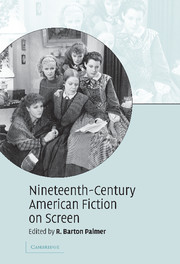Book contents
- Frontmatter
- Contents
- List of illustrations
- Notes on contributors
- Acknowledgments
- Introduction
- 1 A very American fable: the making of a Mohicans adaptation
- 2 Romancing the letter: screening a Hawthorne classic
- 3 The movies in the Rue Morgue: adapting Edgar Allan Poe for the screen
- 4 Readapting Uncle Tom's Cabin
- 5 Screening authorship: Little Women on screen 1933–1994
- 6 Melville's Moby-Dick and Hollywood
- 7 Screening male sentimental power in Ben-Hur
- 8 John Huston's The Red Badge of Courage
- 9 Translating Daisy Miller
- 10 Jane Campion's The Portrait of a Lady
- 11 The Europeans – and the Americans
- 12 Sister Carrie becomes Carrie
- 13 Hollywood and The Sea-Wolf
- 14 An untypical typicality: screening Owen Wister's The Virginian
- Filmography
- Index
6 - Melville's Moby-Dick and Hollywood
Published online by Cambridge University Press: 22 December 2009
- Frontmatter
- Contents
- List of illustrations
- Notes on contributors
- Acknowledgments
- Introduction
- 1 A very American fable: the making of a Mohicans adaptation
- 2 Romancing the letter: screening a Hawthorne classic
- 3 The movies in the Rue Morgue: adapting Edgar Allan Poe for the screen
- 4 Readapting Uncle Tom's Cabin
- 5 Screening authorship: Little Women on screen 1933–1994
- 6 Melville's Moby-Dick and Hollywood
- 7 Screening male sentimental power in Ben-Hur
- 8 John Huston's The Red Badge of Courage
- 9 Translating Daisy Miller
- 10 Jane Campion's The Portrait of a Lady
- 11 The Europeans – and the Americans
- 12 Sister Carrie becomes Carrie
- 13 Hollywood and The Sea-Wolf
- 14 An untypical typicality: screening Owen Wister's The Virginian
- Filmography
- Index
Summary
Investigating the “erotics of reading” in The Pleasure of the Text (1975), Roland Barthes once pondered why “we do not read everything with the same intensity of reading,” why “our very avidity for knowledge impels us to skim or to skip certain passages (anticipated as ‘boring’) … (no one is watching) descriptions, explanations, analyses, conversations.” Of course, no author, Barthes concedes, can predict in advance what will be skipped:
he cannot choose to write what will not be read. And yet, it is the very rhythm of what is read and what is not read that creates the pleasure of the great narratives: has anyone ever read Proust, Balzac, War and Peace, word for word? (Proust's good fortune: from one reading to the next, we never skip the same passages.)
Certainly, no two readers of Moby-Dick (1851), nor the same reader reading subsequently, nor two screenwriters preparing, forty years apart, to adapt the classic novel by Herman Melville (1819–91) for the film medium, skip the same passages or discover the same text. Moby-Dick, after all, is full-to-overflowing with “descriptions, explanations, analyses, conversations” inviting anything but the avid, easily bored student, the supposedly disinterested but often with an ax-to-grind scholar, and the medium-determined and cost-driven screenwriter to pass on by. But it is by no means certain, as with Remembrance of Things Past, that Melville's text has been the beneficiary of these lapses. There are few great books more often misread or maladapted.
- Type
- Chapter
- Information
- Nineteenth-Century American Fiction on Screen , pp. 94 - 105Publisher: Cambridge University PressPrint publication year: 2007
- 1
- Cited by



